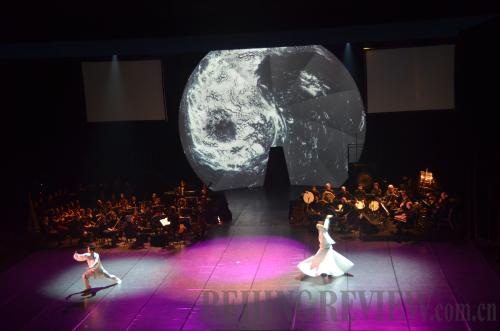|
 |
|
SHINING STARS: Chinese Taijiquan practitioner Chai Yunlong (left) and Turkish Sema performer Adem Demirel give a joint performance during the opening ceremony of the Year of Turkish Culture in China in Beijing on March 21 (CHEN RAN) |
 |
|
Omer Celik, Turkish Culture and Tourism Minister | The Year of Turkish Culture in China saw its curtains raised as the opening ceremony kicked off in Beijing and Shanghai on March 21 and 25, respectively. Omer Celik, Turkish Culture and Tourism Minister, shared his thoughts with Beijing Review reporter Chen Ran on the state of Sino-Turkish relations from a cultural perspective. Excerpts follow:
Beijing Review: The Turkish kebab and the Turkish bath might be the first two things most Chinese people would think of when talking about Turkey. What are your expectations for the Year of Turkish Culture in China? And what else do you want Chinese people to know about your country?
Omer Celik: I am very pleased to know that the Turkish kebab enjoys a high reputation among Chinese people. Actually, the Turkish cuisine as one of the top three cuisines in the world is more than kebabs. The diversity of our cuisine is parallel with the landscape in terms of its regional variations.
In my opinion, Chinese visitors are most interested in our history. Like China, Turkey is rich in history and culture. As a country with a history of thousands of years, Turkey melds both Oriental and Western cultures, and grows with a modern style. That is why visitors across the globe could fit in various travel programs locally.
How do you view the importance of the Year of Culture programs in China and Turkey?
It is meaningful for our side to have Year of Chinese Culture programs in more than 40 cities across Turkey last year. Now we have the Year of Turkish Culture in China this year. It is an important milestone in the bilateral relationship, which has enjoyed rapid development on political as well as economic fronts in recent years.
Turkish fire dancing debuted at this year's Spring Festival Gala on China Central Television, which attracted an audience of 800 million in China and abroad. We hope that more Chinese people could know about and appreciate our culture through media outlets.
Honestly, it is not easy to get all Chinese people involved in Year of Turkish Culture programs because China is a huge country with over 1.3 billion people. But we still attach great importance to the programs and hope to deepen cultural exchanges with our Chinese counterparts.
I think Chinese people are interested in knowing about our country. We hope that the year-round cultural events could let more Chinese people have a deeper impression about our country. I believe that related departments in both countries will enhance cooperation and jointly stage events to engage a larger audience in China.
In the meantime, we see beyond that. I think we should pay more attention to ensure our cultural exchanges will be sustainable after the Year of Turkish Culture ends. In this regard, we have reached consensus on launching culture centers in both countries. Currently, there are only some technical details yet to be confirmed.
Both China and Turkey are eager to promote their cultures abroad to let others better understand them. In your opinion, what opportunities are there for the two countries to cooperate in this field?
I think the relationship between Turkey and China is different from other bilateral relationships. Cooperation in the cultural area is far from adequate compared to the considerable progress we have already achieved in political, economic and many other areas since the two countries established diplomatic relations in 1971.
Inadequate cultural exchanges have hindered the improvement of mutual understanding between Turkey and China. Hence, cultural professionals in both countries carry a mission to fill the gap.
In addition to the success of Year of Culture programs, I would pay more attention to the sustainable development in cultural cooperation. For instance, we would be happy to see more cooperation in tourism and sports, which could push forward diplomatic relations. We hope to have more cooperation with China in football and basketball. The Turkish men's basketball team was the runner-up of the 16th FIBA World Championships in 2010. Basketball is popular in China as well. Hence, we should enhance cooperation.
Just now you mentioned tourism. Chinese tourism professionals often encounter problems in operating tours, such as the process for visa approval taking 10-15 business days. As the new culture and tourism minister of Turkey, how would you address these problems?
We know exactly how important it is for us to attract more visitors. In 2012, some 120,000 Chinese travelers visited Turkey, double the volume of four years ago.
We hope to promote bilateral relations through tourism and people-to-people contact. Therefore, we are going to shorten the visa wait time by simplifying the approval process.
The Year of Culture
The Chinese Ministry of Culture and the Turkish Ministry of Culture and Tourism signed a memorandum of understanding on June 16, 2010, in order to enhance friendly relations, promote exchanges and further mutual understanding. They reaffirmed the importance of cultural exchanges as a crucial way to enrich and consolidate relations between China and Turkey while recalling previous cooperation in this field under the Cultural Agreement signed in Ankara on November 9, 1993.
In accordance with the memorandum of understanding, the two countries agreed to work together to hold the Year of Chinese Culture in Turkey in 2012 and the Year of Turkish Culture in China in 2013.
The theme of the Year of Chinese Culture in Turkey was Charming China, Home of the Silk Road. More than 1,700 Chinese artists presented contemporary Chinese culture as well as China's development in the past three decades in over 40 Turkish cities, attracting more than 300,000 locals. The theme of the Year of Turkish Culture in China is Turkey Is Right Here.
Email us at: yanwei@bjreview.com | 